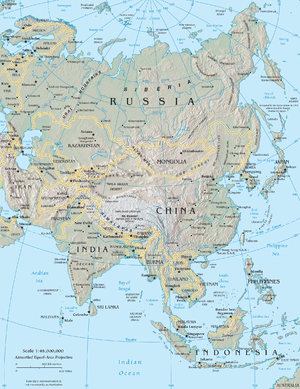This article has multiple issues. Please help improve it or discuss these issues on the talk page. (Learn how and when to remove these messages)
|

The politics of Asia are extremely varied as would be expected of such a large landmass and a diverse population. Constitutional monarchies, absolute monarchies, one-party states, federal states, dependent territories, liberal democracies and military dictatorships are all factors in the region, as well as various forms of independence movements.[citation needed]
Civilization has a long history throughout Asia and it probably involved politics right from the start although some of the earliest discernible political structures arose in Mesopotamia with the advent of writing offering details of these politics. A large and well organized civil service the like of which arose in China is also a necessary adjunct to politics.[citation needed] Much of the political climate in Asia today is affected by colonialism and imperialism of the past with some states retaining close links with their former colonial governors while others involved in bitter independence struggles the consequences of which continue to be felt.[citation needed]
The current situation[when?] is still mixed, with hostilities in parts of Asia such as the continuing tensions over South China Sea, Kashmir, Taiwan, Tibet, North Korea as well as economic competitiveness between China and India. China and India do not have a peace treaty, nor do Russia and Japan or North Korea and South Korea. However, there are also moves towards greater co-operation and communication within the region with Association of Southeast Asian Nations (ASEAN) a notable example.